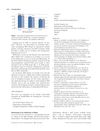 7 citations,
June 2015 in “Cutaneous and Ocular Toxicology”
7 citations,
June 2015 in “Cutaneous and Ocular Toxicology” Some drugs can cause skin reactions, which may improve when the drug is stopped, and rapid diagnosis and stopping the drug is crucial.
 7 citations,
April 2013 in “Clinical and Experimental Dermatology”
7 citations,
April 2013 in “Clinical and Experimental Dermatology” Tianeptine, an antidepressant, may prevent stress-induced hair loss in mice.
 7 citations,
January 2013 in “The journal of investigative dermatology/Journal of investigative dermatology”
7 citations,
January 2013 in “The journal of investigative dermatology/Journal of investigative dermatology” T-cell reconstitution after thymus transplantation can cause hair whitening and loss.
 7 citations,
March 2012 in “European Journal of Pediatrics”
7 citations,
March 2012 in “European Journal of Pediatrics” A boy with a rare skin condition and kidney disease improved with cyclosporine after steroids failed, suggesting a new treatment approach.
 7 citations,
June 2011 in “Movement Disorders”
7 citations,
June 2011 in “Movement Disorders” A specific gene mutation is linked to a hereditary form of dystonia that responds well to certain medications.
 7 citations,
September 2006 in “Clinical lymphoma & myeloma”
7 citations,
September 2006 in “Clinical lymphoma & myeloma” Balancing treatment effectiveness with side effects is crucial for relapsed follicular non-Hodgkin's lymphoma, especially in older patients.
 7 citations,
December 2004 in “Medicine”
7 citations,
December 2004 in “Medicine” Knowing how skin works and its diseases helps doctors diagnose and treat skin conditions better.
 6 citations,
July 2023 in “Nature cell biology”
6 citations,
July 2023 in “Nature cell biology” SOX9 helps determine stem cell roles by interacting with DNA and proteins that control gene activity.
 6 citations,
December 2021 in “Scientific Reports”
6 citations,
December 2021 in “Scientific Reports” Inhibiting class I HDACs helps maintain hair growth ability in skin cells.
 6 citations,
November 2021 in “Frontiers in immunology”
6 citations,
November 2021 in “Frontiers in immunology” STAT3 signaling is important for healthy skin and hair follicles, and its disruption can lead to skin conditions like atopic dermatitis.
 6 citations,
January 2020 in “Dermatology”
6 citations,
January 2020 in “Dermatology” Finasteride may increase suicide risk; more research needed.
 6 citations,
November 2018 in “Histochemistry and Cell Biology”
6 citations,
November 2018 in “Histochemistry and Cell Biology” Mongolian gerbils heal wounds differently than mice, with unique protein levels and gene expression that affect skin repair.
 6 citations,
April 2017 in “Experimental dermatology”
6 citations,
April 2017 in “Experimental dermatology” CD80CD86 deficiency causes hair loss by disrupting regulatory T cells.
 6 citations,
April 2015 in “Behavioural Brain Research”
6 citations,
April 2015 in “Behavioural Brain Research” Finasteride worsens stress effects on sensory processes, possibly linking to anxiety/depression.
 6 citations,
April 2013 in “International Journal of Dermatology”
6 citations,
April 2013 in “International Journal of Dermatology” Dermoscopy helps diagnose unusual skin lesions like osteonevus of Nanta and can prevent misdiagnosis of serious conditions.
 6 citations,
January 2011 in “Springer eBooks”
6 citations,
January 2011 in “Springer eBooks” Nutrition is important for skin health, and changing diet can help prevent and treat skin diseases.
 6 citations,
September 2005 in “Expert Opinion on Pharmacotherapy”
6 citations,
September 2005 in “Expert Opinion on Pharmacotherapy” Androgen therapy can help with symptoms like low libido in women, but more research is needed to understand its long-term safety and effects on health.
 5 citations,
January 2022 in “PloS one”
5 citations,
January 2022 in “PloS one” Deleting the p63 gene in certain cells causes problems in thymus development and severe hair loss in mice.
 5 citations,
January 2020 in “in Vivo”
5 citations,
January 2020 in “in Vivo” Testosterone changes important cell communication proteins in pregnant rats' uteruses, which might affect pregnancy success.
 5 citations,
January 2019 in “Elsevier eBooks”
5 citations,
January 2019 in “Elsevier eBooks” Current therapies cannot fully regenerate adult skin without scars; more research is needed for scar-free healing.
 5 citations,
June 2018 in “Actas Dermo-Sifiliográficas”
5 citations,
June 2018 in “Actas Dermo-Sifiliográficas” In 2017, Spanish dermatologists commonly prescribed topical minoxidil, oral finasteride, and nutricosmetics for hair loss, with oral contraceptives also used for premenopausal women. Less common were oral dutasteride, due to side effects, and newer, more expensive treatments like topical finasteride and Low-Level Laser Therapy. The conclusion is that there's a need for prescription guidelines due to varied treatment approaches.
 5 citations,
January 2016 in “Genetics and Molecular Research”
5 citations,
January 2016 in “Genetics and Molecular Research” Researchers found 617 genes that behave differently in cashmere goat hair follicles, which could help understand hair growth.
 5 citations,
May 2011 in “Movement Disorders”
5 citations,
May 2011 in “Movement Disorders” Finasteride significantly reduced tics and obsessive-compulsive symptoms in Tourette syndrome patients.
 5 citations,
May 2011 in “Movement Disorders”
5 citations,
May 2011 in “Movement Disorders” Finasteride may help reduce tic severity in male Tourette syndrome patients.
 5 citations,
January 2011
5 citations,
January 2011 Gyungokgo-gamibang extract significantly promotes hair growth and increases hair thickness.
 5 citations,
April 2006 in “Skin Research and Technology”
5 citations,
April 2006 in “Skin Research and Technology” Scalp coverage scoring accurately measures hair loss and treatment effectiveness.
 5 citations,
July 1991 in “Irish Journal of Medical Science (1971 -)”
5 citations,
July 1991 in “Irish Journal of Medical Science (1971 -)” Immunosuppressive therapy helps manage autoimmune diseases but carries risks like infection and potential for malignancy.
 4 citations,
November 2023 in “Frontiers in immunology”
4 citations,
November 2023 in “Frontiers in immunology” New treatments targeting T-cell pathways are needed for better alopecia areata management.
 4 citations,
April 2021 in “Experimental and Molecular Medicine”
4 citations,
April 2021 in “Experimental and Molecular Medicine” The conclusion is that certain genetic factors and blood types may affect COVID-19 severity, but changes in ACE2 and TMPRSS2 genes are not clearly linked to it.
 4 citations,
May 2020 in “PLOS ONE”
4 citations,
May 2020 in “PLOS ONE” Ingenol mebutate gel changes gene expression related to skin development and immune response in actinic keratosis.






























